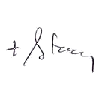The
preparation of the Thanksgiving turkey and dressing (the Southern equivalent of
stuffing, although not cooked inside the bird) has always been my job. I
use my grandmother’s recipe. I generally do the shopping, too, and I do
all the initial preparations the day before. It makes the actual day of celebration
much more relaxing to have those things out of the way. I usually watch
the parade. Some years, I go.
This
year, though, I had been traveling a lot before Thanksgiving, including a
weeklong trip just before, so I made all the preparations far in advance.
I had checked the cabinet to make sure all the required spices were on
hand. I placed a grocery order in advance so that all the necessary
ingredients were delivered before I got home.
I
was not able to do all the prep work the day before because I did not actually
arrive home the afternoon of Thanksgiving Day. Not a problem, or it
shouldn’t have been. Our son Matthew had to work anyway, so we planned to
celebrate the next day. I still had Thanksgiving afternoon to do the prep
work.
What
I did not count on was that New York City had decided to replace the water main
that serves our apartment on Friday, which I had not known about until I got
home. That meant we were without water most of the day. The last
thing you want when cooking Thanksgiving dinner is a kitchen without
water. Still not a problem, I thought. Matthew was also off on
Saturday, so we just pushed everything back another day.
Wrong.
We had plans with old friends from out-of-town Friday night. That was
fun, but it meant that the prep work could not be done the day before.
The water hadn’t come back on in time to do it before we went out. I
certainly didn’t feel like doing it when we got home. I go to bed at
9:00, after all.
That
meant everything was left to do on Saturday. And by then, you know,
Thanksgiving just felt done. I was over it. Matthew slept until
noon. I assumed he was over it, too. Put the turkey in the freezer,
I thought, and I’m ahead of the game for Christmas. Ginger, who had
gotten turkey when we went out to eat after Matthew got home on Thursday night
agreed.
I
explained my plan to Matthew when he got up. I thought surely he would
agree. He did not. “We’re just not going to do Thanksgiving this
year,” I said. “Why?” he asked. I didn’t have a good answer, at
least not one I was willing to say out loud. So I started the prep work
on Saturday afternoon. No parade. Just prep. It was all sort
of out of order in order to make the sequencing work. There was nothing
relaxing about it.
But
by six, dinner was on the table. Matthew was happy. Ginger was
happy. And, though I’d had a grumpy afternoon, I was happy. And
thankful. It’s good not to skip Thanksgiving.
Advent
began on Sunday. It is the season of preparation. A lot of the
shopping got done over the weekend. The tree is going to be delivered
tomorrow (don’t tell the Advent police). The family arrives in just a few
weeks. I will order another turkey. By December 25, all the
preparations will be complete. I have carefully not scheduled any travel
between now and the big day so that I might even have a moment to reflect and
think and pray. All of those things I can plan for. I will be
prepared, but I can’t make Christmas itself happen. That is just out of
my control.
I
can prepare but I can’t make the event itself happen. As the New York
City Water Department helped me learn this Thanksgiving, that is beyond my
control. All I can do is prepare. And wait. The rest is out
of my hands. Prepare as I might, when it comes down to it, my main job is
to wait, to wait on God.
Waiting,
of course, is the part I am particularly bad at, always have been. I got
tired of waiting on Thanksgiving this year and just decided to skip it. I
tried, but my son who has grown up with his dad cooking the Thanksgiving turkey
every single year of his life wouldn’t let me get away with it.
Neither
will God. All we can do is wait. All we really have to do is
wait. That’s what really needs preparing for.
Peace,






